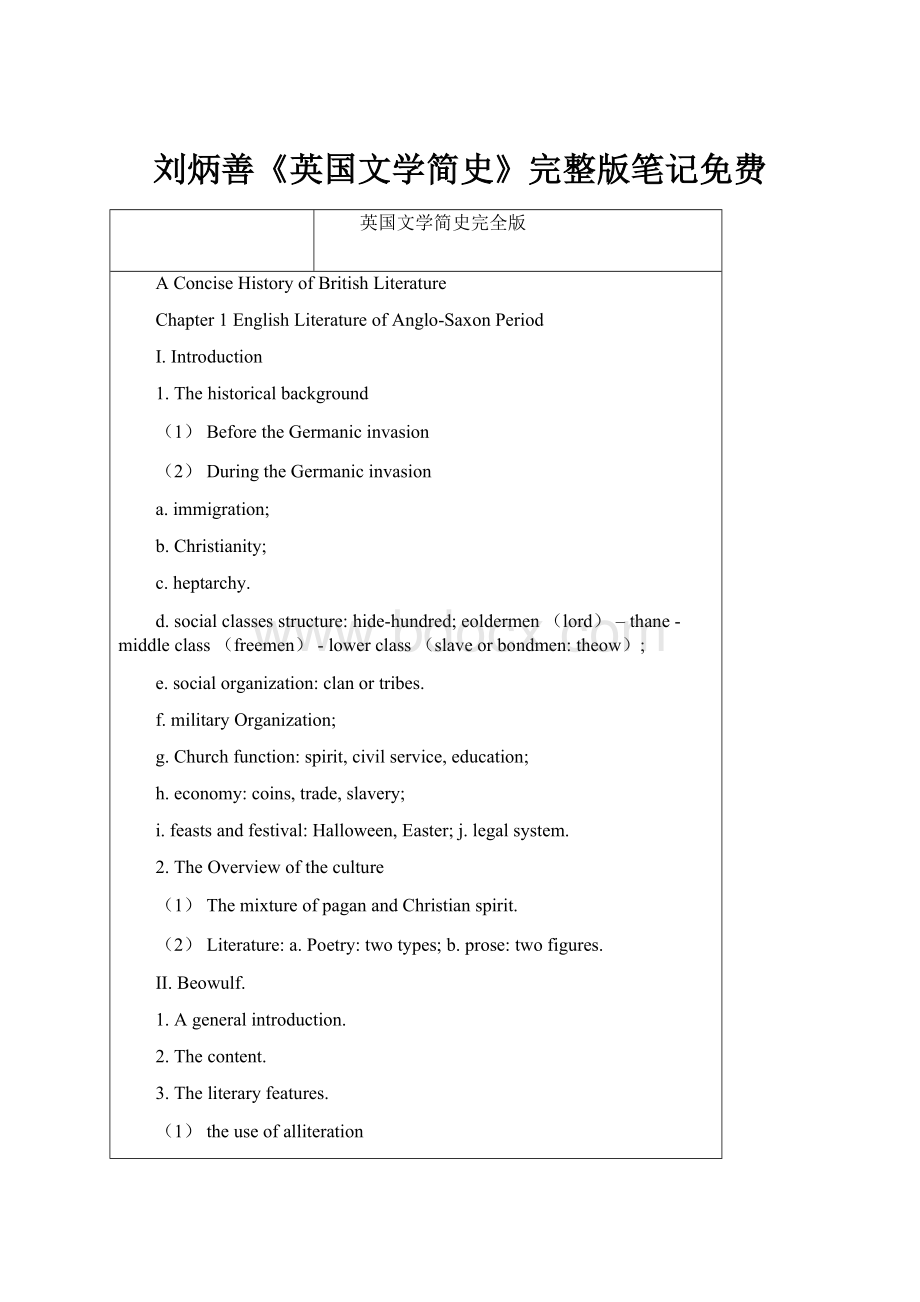刘炳善《英国文学简史》完整版笔记免费.docx
《刘炳善《英国文学简史》完整版笔记免费.docx》由会员分享,可在线阅读,更多相关《刘炳善《英国文学简史》完整版笔记免费.docx(39页珍藏版)》请在冰豆网上搜索。

刘炳善《英国文学简史》完整版笔记免费
英国文学简史完全版
AConciseHistoryofBritishLiterature
Chapter1EnglishLiteratureofAnglo-SaxonPeriod
I.Introduction
1.Thehistoricalbackground
(1)BeforetheGermanicinvasion
(2)DuringtheGermanicinvasion
a.immigration;
b.Christianity;
c.heptarchy.
d.socialclassesstructure:
hide-hundred;eoldermen(lord)–thane-middleclass(freemen)-lowerclass(slaveorbondmen:
theow);
e.socialorganization:
clanortribes.
f.militaryOrganization;
g.Churchfunction:
spirit,civilservice,education;
h.economy:
coins,trade,slavery;
i.feastsandfestival:
Halloween,Easter;j.legalsystem.
2.TheOverviewoftheculture
(1)ThemixtureofpaganandChristianspirit.
(2)Literature:
a.Poetry:
twotypes;b.prose:
twofigures.
II.Beowulf.
1.Ageneralintroduction.
2.Thecontent.
3.Theliteraryfeatures.
(1)theuseofalliteration
(2)theuseofmetaphorsandunderstatements
(3)themixtureofpaganandChristianelements
III.TheOldEnglishProse
1.Whatisprose?
2.figures
(1)TheVenerableBede
(2)AlfredtheGreat
Chapter2EnglishLiteratureoftheLateMedievalAgesI.Introduction
1.TheHistoricalBackground.
(1)Theyear1066:
NormanConquest.
(2)Thesocialsituationssoonaftertheconquest.
A.Normannoblesandserfs;
B.restorationofthechurch.
(3)The11thcentury.
A.thecrusadeandknights.
B.dominanceofFrenchandLatin;
(4)The12thcentury.
A.thecentralizedgovernment;
B.kingsandthechurch(HenryIIandThomas);
(5)The13thcentury.
A.ThelegendofRobinHood;
B.MagnaCarta(1215);
C.thebeginningoftheParliament
D.EnglishandLatin:
officiallanguages(theend)
(6)The14thcentury.
a.theHouseofLordsandtheHouseofCommons—conflictbetweentheParliamentandKings;
b.theriseoftowns.
c.thechangeofChurch.
d.theroleofwomen.
e.theHundredYears'War—starting.
f.thedevelopmentofthetrade:
London.
g.theBlackDeath.
h.thePeasants'Revolt—1381.
i.ThetranslationofBiblebyWycliffe.
(7)The15thcentury.
a.ThePeasantsRevolt(1453)
b.TheWarofRosesbetweenLancasterandYorks.
c.theprinting-press—WilliamCaxton.
d.thestartingofTudorMonarchy(1485)
2.TheOverviewofLiterature.
(1)thestoriesfromtheCelticlandsofWalesandBrittany—greatmythsoftheMiddleAges.
(2)GeoffryeofMonmouth—HistoriaRegumBritanniae—KingAuthur.
(3)Wace—LeRomandeBrut.
(4)Theromance.
(5)thesecondhalfofthe14thcentury:
Langland,Gawinpoet,Chaucer.
II.SirGawinandGreenKnight.
1.Ageneralintroduction.
2.Theplot.
III.WilliamLangland.
1.Life
2.PiersthePlowman
IV.Chaucer
1.Life
2.LiteraryCareer:
threeperiods
(1)Frenchperiod
(2)Italianperiod
(3)masterperiod
3.TheCanterburyTales
A.TheFramework;
B.TheGeneralPrologue;
C.TheTaleProper.
4.HisContribution.
(1)HeintroducedfromFrancetherhymedstanzaofvarioustypes.
(2)HeisthefirstgreatpoetwhowroteinthecurrentEnglishlanguage.
(3)ThespokenEnglishofthetimeconsistedofseveraldialects,andChaucerdidmuchinmakingthedialectofLondonthestandardforthemodernEnglishspeech.
V.PopularBallads.
VI.ThomasMaloryandEnglishProse
VII.ThebeginningofEnglishDrama.
1.MiraclePlays.
MiracleplayormysteryplayisaformofmedievaldramathatcamefromdramatizationoftheliturgyoftheRomanCatholicChurch.Itdevelopedfromthe10thtothe16thcentury,reachingitsheightinthe15thcentury.Thesimplelyriccharacteroftheearlytextswasenlargedbytheadditionofdialogueanddramaticaction.Eventuallytheperformancewasmovedtothechurchyardandthemarketplace.
2.MoralityPlays.
Amoralityplayisaplayenforcingamoraltruthorlessonbymeansofthespeechandactionofcharacterswhicharepersonifiedabstractions–figuresrepresentingvicesandvirtues,qualitiesofthehumanmind,orabstractconceptionsingeneral.
3.Interlude.
Theinterlude,whichgrewoutofthemorality,wasintended,asitsnameimplies,tobeusedmoreasfillerthanasthemainpartofanentertainment.Asitsbestitwasshort,witty,simpleinplot,suitedforthediversionofguestsatabanquet,orfortherelaxationoftheaudiencebetweenthedivisionsofaseriousplay.Itwasessentiallyanindoorsperformance,andgenerallyofanaristocraticnature.
Chapter3EnglishLiteratureintheRenaissanceI.AHistoricalBackground
II.TheOverviewoftheLiterature(1485-1660)
Printingpress—readership—growthofmiddleclass—trade-educationforlaypeople-centralizationofpower-intellectuallife-exploration-newimpetusanddirectionofliterature.
Humanism-studyoftheliteratureofclassicalantiquityandreformededucation.
Literarystyle-modeledontheancients.
Theeffectofhumanism-thedisseminationofthecultivated,clear,andsensibleattitudeofitsclassicallyeducatedadherents.
1.poetry
ThefirsttendencybySidneyandSpenser:
ornate,florid,highlyfiguredstyle.
ThesecondtendencybyDonne:
metaphysicalstyle—complexityandingenuity.
ThethirdtendencybyJohnson:
reaction——Classicallypureandrestrainedstyle.
ThefourthtendencybyMilton:
centralChristianandBiblicaltradition.
2.Drama
a.thenativetraditionandclassicalexamples.
b.thedramastandshighestinpopularestimation:
Marlowe–Shakespeare–Jonson.
3.Prose
a.translationofBible;
b.More;
c.Bacon.
II.Englishpoetry.
1.SirThomasWyattandHenryHoward(courtlymakers)
(1)Wyatt:
introducingsonnets.
(2)Howard:
introducingsonnetsandwritingthefirstblankverse.
2.SirPhilipSidney—poet,critic,prosewriter
(1)Life:
a.Englishgentleman;
b.brilliantandfascinatingpersonality;
c.courtier.
(2)works
a.Arcadia:
pastoralromance;
b.AstrophelandStella(108):
sonnetsequencetoPenelopeDvereux—platonicdevotion.
Petrarchanconceitsandoriginalfeelings-movingtocreativeness—building ofanarrativestory;theme-loveoriginality-actofwriting.
c.DefenseofPoesy:
anapologyforimaginativeliterature—beginning ofliterarycriticism.
3.EdmundSpenser
(1)life:
Cambridge-Sidney'sfriend-“Areopagus”–Ireland-WestminsterAbbey.
(2)works
a.TheShepherdsCalendar:
thebuddingofEnglishpoetryinRenaissance.
b.AmorettiandEpithalamion:
sonnetsequence
c.FaerieQueen:
lThegeneralend——Aromanticandallegoricalepic—stepstovirtue.
l12booksand12virtues:
Holiness,temperance,justiceandcourtesy.
lTwo-levelfunction:
partofthestoryandpartofallegory(symbolicmeaning)
lManyallusionstoclassicalwriters.
LThemes:
puritanism,nationalism,humanismandRenaissanceNeoclassicism—aChristianhumanist.
(3)SpenserianStanza.
III.EnglishProse
1.ThomasMore
(1)Life:
“Renaissanceman”,scholar,statesman,theorist,prosewriter,diplomat,patronofarts
a.learnedGreekatCanterburyCollege,Oxford;
b.studieslawatLincolnInn;
c.LordChancellor;
d.beheaded.
(2)Utopia:
thefirstEnglishsciencefiction.
WritteninLatin,twoparts,thesecond—placeofnowhere.
Aphilosophicalmariner(RaphaelHythloday)tellshisvoyagesinwhichhediscoversaland-Utopia.
a.Thepartoneisorganizedasdialoguewithmarinerdepictinghisphilosophy.
b.Theparttwoisadescriptionoftheislandkingdomwheregoldandsilverarewornbycriminal,religiousfreedomistotalandnooneownsanything.
c.thenatureofthebook:
attackingthechiefpoliticalandsocialevilsofhistime.
d.thebookandtheRepublic:
anattempttodescribetheRepublicinanewway,butitpossessesanmoderncharacterandtheresemblanceisinexternals.
e.itplayedakeyroleintheHumanistawakeningofthe16thcenturywhichmovedawayfromtheMedievalotherworldlinesstowardsRenaissancesecularism.
f.theUtopia
(3)thesignificance.
a.itwasthefirstchampionofnationalideasandnationallanguages;itcreatedanationalprose,equallyadaptedtohandlingscientificandartisticmaterial.
b.aelegantLatinscholarandthefatherofEnglishprose:
hecomposedworksinEnglish,translatedfromLatinintoEnglishbiography,wroteHistoryofRichardIII.
2.FrancisBacon:
writer,philosopherandstatesman
(1)life:
Cambridge-humanisminParis–knighted-LordChancellor–bribery-focusingonphilosophyandliterature.
(2)philosophicalideas:
advancementofscience—people:
servants andinterpretersofnature—method:
achildbeforenature—factsandobservations:
experimental.
(3)“Essays”:
57.
a.hewasamasterofnumerousandvariedstyles.
b.hismethodistoweighandbalancematers,indicatingtheidealcourseofactionandthepracticalone,pointingouttheadvantagesanddisadvantagesofeach,butleavingthereader tomakethefinaldecisions.(arguments)
IV.EnglishDrama
1.Ageneralsurvey.
(1)Everymanmarksthebeginningofmoderndrama.
(2)twoinfluences.
a.theclassics:
classicalinformandEnglishincontent;
b.nativeorpopulardrama.
(3)theUniversityWits.
2.ChristopherMarlowe:
greatestplaywrightbeforeShakespeareandmostgiftedoftheWits.
(1)Life:
firstinterestedinclassicalpoetry—thenindrama.
(2)Majorworks
a.Tamburlaine;
b.TheJewofMalta;
c.TheTragicalHistoryofDoctorFaustus.
(3)Thesignificanceofhisplays.
V.WilliamShakespeare
1.Life
(1)1564,Stratford-on-Avon;
(2)GrammarSchool;
(3)QueenvisittoCastle;
(4)marriagetoAnneHathaway;
(5)London,theGlobeTheatre:
smallpartandproprietor;
(6)the1stFolio,Quarto;
(7)Retired,son—Hamlet;H.1616.
2.Dramaticcareer
3.Majorplays-men-centered.
(1)RomeoandJuliet——tragicloveandfate
(2)TheMerchantofVenice.
Goodoverevil.
Anti-Semitism.
(3)HenryIV.
Nationalunity.
Falstaff.
(4)JuliusCaesar
Republicanismvs.dictatorship.
(5)Hamlet
Revenge
Good/evil.
(6)Othell